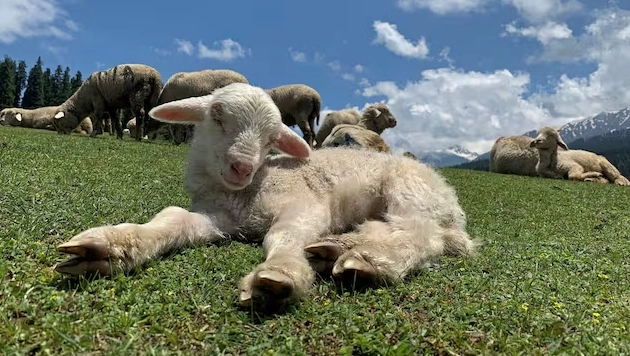
In what is being called a “ground-breaking scientific achievement", researchers at a Kashmir university have produced India’s first gene-edited sheep.
Marking a historic milestone in the field of animal biotechnology, the Sher-e-Kashmir University of Agricultural Sciences and Technology (SKUAST) said the edited sheep contains no foreign DNA, distinguishing it from transgenic organisms and paving the way for regulatory approval under India’s evolving biotech policy framework.
The gene editing was performed using CRISPR-Cas9 technology and adhered to international biosafety protocols. The feat was achieved by a team of researchers led by the dean of the faculty of Veterinary Sciences, SKUAST-Kashmir, Riaz Ahmad Shah, after a research of around four years. The same team had previously cloned India’s first Pashmina goat – ‘Noori’ – in 2012, a milestone that garnered global acclaim.
“This path-breaking development places India on the global map of advanced genome editing technologies and positions SKUAST-Kashmir at the forefront of reproductive biotechnology research," Shah said.
Shah said the gene-edited lamb has been modified for the ‘myostatin’ gene — a regulator of muscle growth. “Gene, muscle mass in the animal is enhanced by nearly 30%, a trait naturally absent in Indian sheep breeds but known in select European breeds like the Texel. The introduction of this mutation through gene editing, and not through traditional crossbreeding, represents a technological leap akin to the revolution Artificial Intelligence (AI) is driving in the 21st century," he said.
He said adding the gene controlling muscle development was previously undertaken in the US, China and European Union. They expect the muscle mass of the sheep to increase with “small modification of the gene", he added.
Shah further said this achievement comes on the heels of the recent release of India’s first gene-edited rice variety, endorsed by the Union agriculture minister, and further cements India’s growing prowess in genomic science.
Nazir Ahmad Ganai, SKUAST-Kashmir vice-chancellor, described the achievement as the birth of a new era in livestock genetics in the country.
“This is not just the birth of a lamb, but the birth of a new era in livestock genetics in India. With gene editing, we can bring precise, beneficial changes without introducing foreign DNA, making the process efficient, safe, and potentially acceptable to both regulators and consumers," he said.
Ganai said biotechnology, in association with AI and other next-gen technologies, is emerging as a key driver towards achieving a sustainable bio-economy for a developed India. Leading institutions like SKUAST-Kashmir can play a pivotal role in ensuring livelihood, food security, and sustainability for future generations, he said.
“This success is part of SKUAST-Kashmir’s broader vision to build India’s most advanced reproductive biotechnology facility, combining cutting-edge research with real-world applications for agriculture and animal husbandry. It also reflects the university’s unwavering commitment to innovation, scientific excellence, and nation-building through biotechnology," he said.
(With PTI inputs)